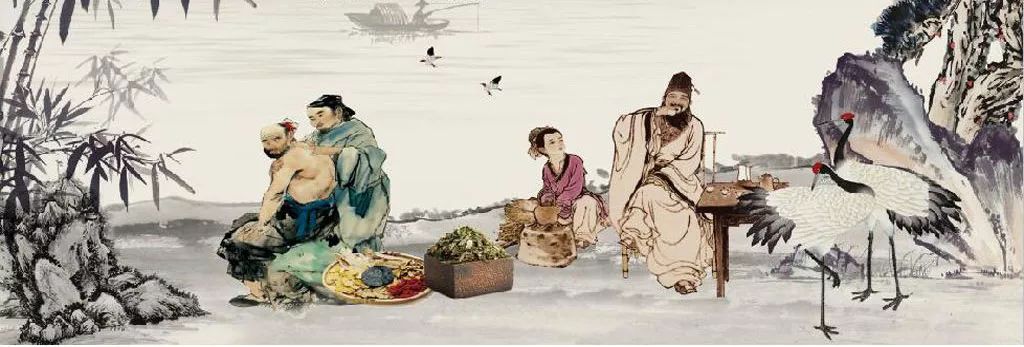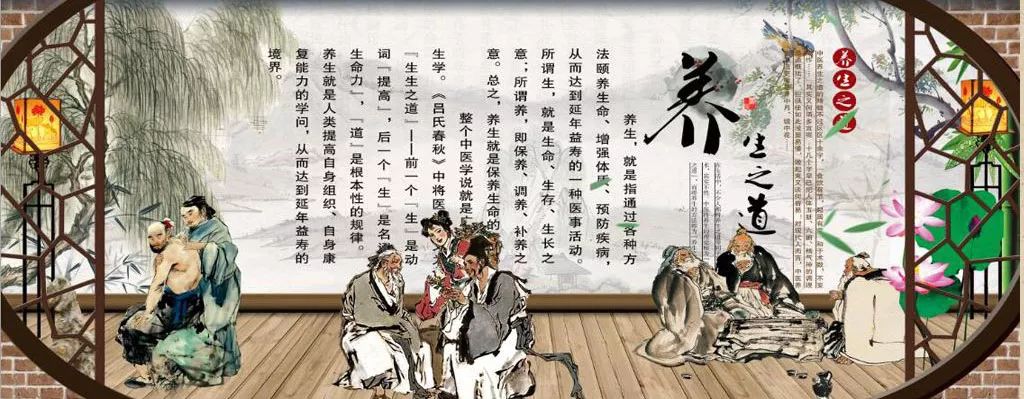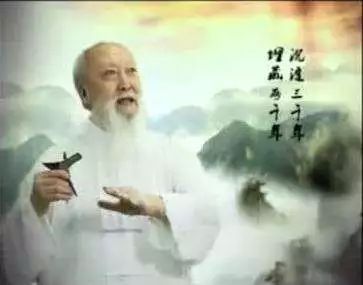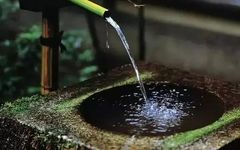The “Tao Te Ching” states: “Do not value the worthy, so that the people do not compete. Do not treasure hard-to-obtain goods, so that the people do not steal. Do not let desires be seen, so that the people’s hearts do not become chaotic. Therefore, the sage governs by emptying their hearts, filling their bellies, weakening their ambitions, and strengthening their bones; they often keep the people ignorant and desireless, so that the wise do not dare to act. By doing nothing, nothing is left ungoverned.”
This passage reflects the Daoist philosophy of “wu wei” (non-action). Its core idea is that one should not overly promote or advocate any particular doctrine, thought, goal, or behavior; the best state is achieved naturally, and through non-action, one can accomplish everything.
Health preservation is a topic of great concern in our lives. Many friends spend a significant amount of time and money on health preservation. Who does not want to be healthy, maintain their appearance, and live a long life?

The relationship between health preservation and life determines the multifaceted nature of health preservation views. So, what is health preservation? Why should we preserve health? How do we preserve health? Let us explore the rich history and connotations of health preservation culture through the insightful speeches of experts at the Health Preservation Cultural Summit.
Traditional Chinese Medicine (TCM) health preservation mainly includes the concepts of prevention, holism, balance, and dialectics.
1. Prevent illness before it occurs, and nurture oneself before aging.
2. Harmony between heaven and humanity, integration of body and spirit.
3. Adjust yin and yang, supplement deficiencies and rectify excesses.
4. Maintain regularity in activity and rest, achieving harmony and moderation.
Firstly, TCM health preservation emphasizes cultivating virtue, which is the most important condition for health and longevity. TCM has always valued mental health. Over two thousand years ago, the medical text “Huangdi Neijing” stated, “Calmness and emptiness lead to true qi, and guarding the spirit internally prevents illness from arising,” clearly indicating that health preservation should focus on mental well-being. The concept of cultivating virtue in ancient texts is primarily reflected in the harmony with the Dao, where virtue is not endangered, and pure virtue leads to longevity. The ideal state of immortality and boundless blessings must begin with transforming lifestyle diseases and social maladies, fundamentally improving human physical and moral qualities, and striving to uplift those with inferior qualities to reach the realm of the wise, saints, and divine beings. This is the scientific revolution achieved through the harmony with the Dao and the cultivation of virtue.
The second key factor in health preservation is engaging in regular exercise. Those who are ill need to exercise, and those who are not ill also need to prevent illness through exercise. Exercise strengthens the body, enhances willpower, promotes digestion and circulation, and boosts immunity.
The third point is to maintain mental, emotional, and psychological health. Health preservation requires us to cultivate a healthy spirit and stable emotions to avoid extreme mental states, emotional fluctuations, and instability. According to TCM, anger harms the liver, joy affects the heart, worry harms the spleen, grief affects the lungs, and fear harms the kidneys. This further illustrates that emotional and psychological health care is a crucial aspect of overall health. Among all detrimental factors affecting the body, negative emotions are the most likely to lead to premature death. When a person’s mental state is normal, their ability to adapt to the environment and resist disease increases, thus serving a preventive role against illness.

Health Preservation for Women
1) Arrange three meals reasonably. Breakfast should consist of high-fiber cereal and low-fat fresh milk, especially when paired with natural plant foods, which not only helps eliminate excessive fat intake but also aids in fat reduction without hindering nutritional health. These foods are natural waist-slimming options that can help reduce waist size in a short time. As for meat and seafood, they can be reserved for lunch, while dinner should be light, with vegetables making up the majority. Konjac (魔芋, mó yù) is particularly suitable for women’s health preservation. Snacks can include tamarind and passion fruit.
2) Stand for half an hour after meals. The main reason for women’s waist gain is negligence due to busy work and study, leaving no time to properly manage their lifestyle and diet. Standing for at least half an hour after meals can prevent fat accumulation in the abdomen and save the trouble of compensating later.
 3) Avoid eating for five hours before sleep. One major taboo for weight loss is eating before sleeping. During sleep, the body does not require movement, and the food consumed will be absorbed and converted into fat. If hunger is unbearable, only a small amount of boiled vegetables or fruits should be consumed.
3) Avoid eating for five hours before sleep. One major taboo for weight loss is eating before sleeping. During sleep, the body does not require movement, and the food consumed will be absorbed and converted into fat. If hunger is unbearable, only a small amount of boiled vegetables or fruits should be consumed.
4) Do not rush to get out of bed. After waking up in the morning, lie on your back and stretch your body. Then, place your limbs on the ground and arch your back to give your spine time to “wake up,” which can prevent back pain and maintain good posture, starting each day in a pleasant mood.
5) Clean the kitchen. After eating, do not immediately sit down or lie down to rest; first, tidy the dining table and wash the dishes, then find some other tasks to do. Forcing yourself to exercise for 15 minutes after meals is another simple and effective method to maintain stable weight.
Health Preservation for Men
Editor
Traditional Chinese Medicine believes that the foundation of men’s health lies in the liver and kidneys, with the kidneys representing water and the liver representing wood. Water nourishes wood; therefore, TCM emphasizes that the kidneys are fundamental for men. TCM advocates kidney health by focusing on conserving essence and energy. Here are five methods for men to preserve essence according to TCM:

Moderate Desire
In TCM, it is said that emotional arousal affects the kidneys, and when the kidneys are stimulated, essence is also stimulated. To ensure sufficient kidney qi, we must control the stimulation of essence, thus keeping the heart calm. Therefore, moderation in desire is the first major principle for men to nourish their kidneys.
Moderate Labor
One should not overexert themselves. TCM believes that essence is derived from blood, and essence is the manifestation of blood. Therefore, it is essential to protect the blood.
Calm Anger
Anger harms the liver, which stores blood. If one frequently gets angry, it can deplete liver blood and essence. Thus, we must control our temper, manage anger, and learn to interact with others calmly.
Avoid Alcohol
Alcohol can stimulate blood flow. While moderate drinking can activate the body’s vitality, excessive drinking can disrupt qi and blood balance, so alcohol consumption should be moderated.
Be Mindful of Flavor
Mindful eating means avoiding overeating and focusing on nourishing essence with grains. There is a saying in TCM: “Grains are the best for nourishing essence.”
Health Preservation for the Elderly
Editor
Avoid Excessive Refined Foods
Elderly individuals often focus on consuming refined white rice and flour, which reduces fiber intake.
This can weaken gastrointestinal motility, leading to constipation.
Avoid Excessive Meat
Excessive fat from meat in the diet of the elderly can lead to nutritional imbalances and metabolic disorders, increasing the risk of hypercholesterolemia and hyperlipidemia, which is detrimental to the prevention and treatment of cardiovascular diseases.
Avoid Hard Foods
The digestive and absorption functions of the elderly are weakened. If they indulge in hard or undercooked foods, they may suffer from indigestion or gastrointestinal diseases over time.
Avoid Late Meals
Meals should be eaten early rather than late, which is beneficial for digestion and post-meal rest, avoiding food accumulation or hypoglycemia.
Avoid Hot Foods
Elderly individuals should consume food that is warm rather than hot, as hot food can damage the mouth, esophagus, and stomach. Long-term consumption of hot food can increase the risk of stomach and esophageal cancer.
Avoid Eating Quickly
Elderly individuals with missing teeth should not rush while eating, as inadequate chewing can increase the digestive burden on the stomach. Additionally, this can lead to accidents such as choking on fish bones or meat bones.
Avoid Excessive Alcohol
Long-term excessive drinking can lead to myocardial degeneration, losing normal elasticity and increasing the burden on the heart. Moreover, excessive drinking can also lead to liver cirrhosis.

